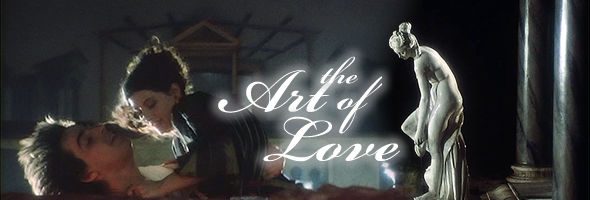
Color, 1983, 96m.
Directed by Walerian Borowczyk
Starring Marina Pierro, Michele Placido, Massimo Girotti, Laura Betti, Milena Vukotic, Philippe Taccini
Severin (US R1 NTSC) / WS (1.78:1) (16:9)
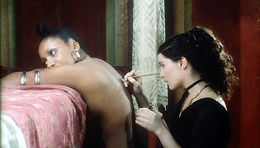 In ancient Rome, poet and philosopher Ovid (Girotti) lectures to a colorful gallery of students whose lives intertwine with the local military. One of these is Clauda (Pierro), a beautiful woman who enjoys rolling around naked in a glass tub while her officer husband, Macarius (Placido), is often away. Ovid's
In ancient Rome, poet and philosopher Ovid (Girotti) lectures to a colorful gallery of students whose lives intertwine with the local military. One of these is Clauda (Pierro), a beautiful woman who enjoys rolling around naked in a glass tub while her officer husband, Macarius (Placido), is often away. Ovid's 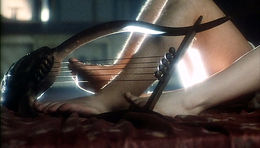 teachings about the "art of love," from initial courtship to seduction regardless of the social boundaries of marriage, encourage handsome young student Cornelius (Taccini) to make advances towards Claudia to which she proves receptive. Meanwhile Claudia's guardian in her husband's absence, her mother-in-law Clio (Betti), has carnal issues of her own which prove to be her downfall. In between hallucinatory erotic fantasies (including a bizarre sequence involving Pierro inside a hollow cow mounted by a man in a bull outfit and naughty orgy footage pilfered from Caligula: The Untold Story), the love triangle builds to a violent resolution and a hugely destructive finale before a surprising, time-tripping twist ending.
teachings about the "art of love," from initial courtship to seduction regardless of the social boundaries of marriage, encourage handsome young student Cornelius (Taccini) to make advances towards Claudia to which she proves receptive. Meanwhile Claudia's guardian in her husband's absence, her mother-in-law Clio (Betti), has carnal issues of her own which prove to be her downfall. In between hallucinatory erotic fantasies (including a bizarre sequence involving Pierro inside a hollow cow mounted by a man in a bull outfit and naughty orgy footage pilfered from Caligula: The Untold Story), the love triangle builds to a violent resolution and a hugely destructive finale before a surprising, time-tripping twist ending.
Probably shuffled into production after the international attention given to Caligula and its successors, this peculiar sexual fantasy was Borowczyk's follow-up to the considerably more savage and explicit Dr. Jekyll and His Women, though there's still a hefty amount of skin and mayhem once you get past the relatively listless opening half hour. Pierro is magnetic and stunningly beautiful as always, while the I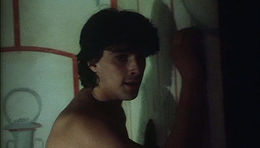 talian financing means a surprisingly prestigious cast
talian financing means a surprisingly prestigious cast 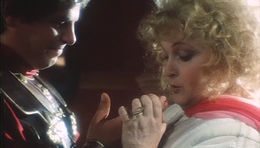 including pros like Girotti (Last Tango in Paris), Betti (Teorema), and Placido (Plot of Fear) along with the usual cast of undraped Borowczyk extras. This certainly isn't the best place for newcomers to start, but his admirers will find plenty to enjoy in the director's idiosyncratic portrayal of Roman sexual manners.
including pros like Girotti (Last Tango in Paris), Betti (Teorema), and Placido (Plot of Fear) along with the usual cast of undraped Borowczyk extras. This certainly isn't the best place for newcomers to start, but his admirers will find plenty to enjoy in the director's idiosyncratic portrayal of Roman sexual manners.
As this is an Italian production, dialogue tracks were assembled in post-production and don't really synch up in any existing version; you can forget the more subtle and witty French tracks found in Borowczyk's other major films. The English dub here is often awkward and unconvincing, but anyone familiar with '80s cult films from Italy will recognize a lot of the voices heard here. Severin's disc is anamorphic and uncut but was probably taken straight from the master the licensor provided, which means it's a bit soft and dated looking (with the director's penchant for hazy lighting not helping things much). The 1.66:1 compositions are also slightly trimmed at the top and bottom, though this only proves destructive in a handful of shots. The only extra is an Italian theatrical trailer which naturally focuses on Pierro's memorable opening credits bathing sequence as its central visual motif.

Color, 1979, 93m.
Directed by Walerian Borowczyk
Starring Marina Pierro, Gaelle Legrand, Pascale Christophe, Fran ois Gu tary, Jean-Claude Dreyfuss, Jean Martinelli
Severin (US R1 NTSC) / WS (1.66:1) (16:9)
Following the success of Immoral Tales in the mid-1970s, director Walerian Borowczyk made a belated return 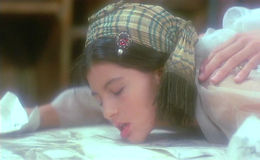 to the erotic anthology concept in 1979 with Les H ro nes du Mal ("Heroines of Evil"), which was titled Three Immoral Women for its few English-language appearances and then (wisely) shortened to simply Immoral Women for its DVD release. Once again the theme of sex, deception and profit through the ages is prominent here, but this time women gain the upper hand each time through their crafty application of physical attractiveness and emotional manipulation.
to the erotic anthology concept in 1979 with Les H ro nes du Mal ("Heroines of Evil"), which was titled Three Immoral Women for its few English-language appearances and then (wisely) shortened to simply Immoral Women for its DVD release. Once again the theme of sex, deception and profit through the ages is prominent here, but this time women gain the upper hand each time through their crafty application of physical attractiveness and emotional manipulation.
The always ravishing Marina Pierro (a Borowczyk regular who had just appeared in his Behind Convent Walls) stars in the first segment, "Margherita," as a young woman whose passionate relationship with her poor tradesman boyfriend is hampered by their lack of funds. She seizes an opportunity to become the muse and model for a handsome young painter (Gu tary), seducing both him and his unscrupulous patron, Bini (Dreyfus, best known as the crazed cannibal butcher from Delicatessen). How her bed-hopping profits her is, of course, a secret not revealed under the cheeky finale.
The second and most notorious episode concerns "Marceline" (Tender Cousins' Legrand), a frizzy-haired nymphet who spends her afternoons on the 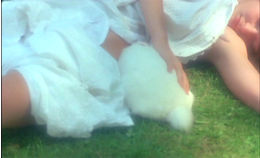 lawn getting a bit more pleasure than is socially acceptable from her flurry white pet rabbit. Her parents don't take kindly to her activities and decide to take matters into their own hands, with unbelievably perverse results...
lawn getting a bit more pleasure than is socially acceptable from her flurry white pet rabbit. Her parents don't take kindly to her activities and decide to take matters into their own hands, with unbelievably perverse results...
The last and shortest story follows the modern day adventures of "Marie" (Christophe), an unhappily married woman taken hostage by a randy criminal who decides to take advantage of her in his van. With the help of the family pooch, she discovers a way to get rid of all of her problems in one fell swoop, with the expected naughty wink at the end.
Though it doesn't have any casting novelty gimmicks like the preceding Immoral film, this is in every way a worthy companion piece and certainly as satisfying a piece of erotica as Borowczyk ever delivered. His wonderfully surreal sense of humor is well in evidence here, with each story taking a number of hilarious and often weird turns with murders often doled out as a matter of course. 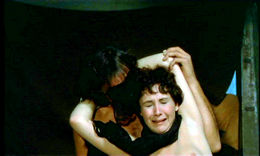 His anti-clerical jabs are still present as well, with a stern Pope duped by both Margherita and a hilarious Michelangelo who gets away with frolicking with naked boys under the eye of the church. The "immorality" implied by the title is clearly a reference to the women's philosophical choices to achieve their ends rather than a condemnation of their sexuality itself. In purely sensual terms this is also one of Borowczyk's most accomplished films, with Pierro in particular filmed as beautifully as any actress who ever stepped in front of a camera.
His anti-clerical jabs are still present as well, with a stern Pope duped by both Margherita and a hilarious Michelangelo who gets away with frolicking with naked boys under the eye of the church. The "immorality" implied by the title is clearly a reference to the women's philosophical choices to achieve their ends rather than a condemnation of their sexuality itself. In purely sensual terms this is also one of Borowczyk's most accomplished films, with Pierro in particular filmed as beautifully as any actress who ever stepped in front of a camera.
Various video editions of this film have circulated on the fan market over the years, usually originating from Greece or Japan. However, many shots were lost depending on the version, with virtually all male nudity and some frontal female close-ups hitting the cutting room floor; one particularly startling visual involving hymenal blood was always the first to go. Severin's release presents the complete version of the film thankfully uncensored, and the image quality is also a considerable improvement; apart from some limitations in the original film itself (a few rough cuts and bits of debris here and there), this is a stunning presentation of a film that's been crying out for an adequate transfer. The soundtrack can be played in the original French with optional subtitles or a not-bad English dub track. Extras include a thorough Borowzcyk bio by Richard Harland Smith and the evocative European theatrical trailer.
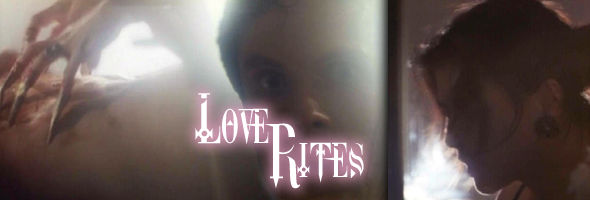
Color, 1988, 97m.
Directed by Walerian Borowczyk
Starring Mathieu Carri re, Marina Pierro
Kino Lorber (Blu-ray) (US RA HD), Cult Epics (US R1 NTSC), Pagan (UK R2 PAL) / WS (1.55:1)
This last completed feature film from director Walerian Borowczyk offers an erotic, dreamlike chamber drama between two participants, the 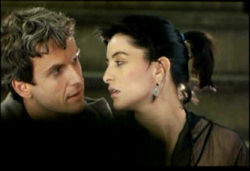 stone-faced Hugo (Carri re) and prostitute Myriam (Borowczyk muse Pierro from Dr. Jekyll and His Women). The two meet during a strange flirtation in the Paris metro; transfixed, Hugo accompanies her across the city and to a local church where they enjoy some heavy petting by a confessional booth. Eventually they wind up at a fauna-filled apartment where they make love all afternoon, occasionally pausing to enjoy such poetic moments as a butterfly resting aloft Miriam's privates. However, the tryst takes a nasty turn when she decides to cut Hugo down to size using her bare hands... with a few nasty additions.
stone-faced Hugo (Carri re) and prostitute Myriam (Borowczyk muse Pierro from Dr. Jekyll and His Women). The two meet during a strange flirtation in the Paris metro; transfixed, Hugo accompanies her across the city and to a local church where they enjoy some heavy petting by a confessional booth. Eventually they wind up at a fauna-filled apartment where they make love all afternoon, occasionally pausing to enjoy such poetic moments as a butterfly resting aloft Miriam's privates. However, the tryst takes a nasty turn when she decides to cut Hugo down to size using her bare hands... with a few nasty additions.
Virtually plotless even by the director's standards, this eerie ode to the impossibility of reconciling the theory of love with its painful realities features a magnetic performance by the beautiful Pierro, who also memorably starred in Jean Rollin's The Living Dead Girl the following year. Her swift retirement from European cinema after this film is cause of mourning 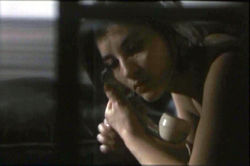 indeed. The typically blank Carriere performs the role of a perplexed male adequately enough, but he really takes a backseat to the leading lady and Borowczyk's sumptuous visuals. The filmmaker's usual fixations are all in place, from soft focus shots of burnished antiquities to disorienting close ups of human anatomy transfixed with strange props. Obviously the brutal finale (which isn't much of a surprise since it's featured prominently on every piece of advertising art related to the film) lingers most strongly afterwards, but the slow, methodical buildup is certainly worth savoring for Boro-philes. It's certainly not the best choice for newcomers, however, especially those expecting graphic displays of skin; while both leads spend most of the film's second half in various stages of undress, the film is
indeed. The typically blank Carriere performs the role of a perplexed male adequately enough, but he really takes a backseat to the leading lady and Borowczyk's sumptuous visuals. The filmmaker's usual fixations are all in place, from soft focus shots of burnished antiquities to disorienting close ups of human anatomy transfixed with strange props. Obviously the brutal finale (which isn't much of a surprise since it's featured prominently on every piece of advertising art related to the film) lingers most strongly afterwards, but the slow, methodical buildup is certainly worth savoring for Boro-philes. It's certainly not the best choice for newcomers, however, especially those expecting graphic displays of skin; while both leads spend most of the film's second half in various stages of undress, the film is 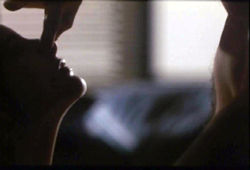 more concerned with the psychological undulations of passion rather than the physical ones.
more concerned with the psychological undulations of passion rather than the physical ones.
Released in most European countries under a variety of titles ranging from the original C r monie d'amour to the evocative Queen of the Night (a reference to Myriam's poetic alter ego), Love Rites makes its American debut courtesy of Cult Epics in a double-sided disc containing the original 97-minute cut of the film and an abbreviated, 87-minute "director's cut." Like the dual versions of The Beast, the edits mainly speed up the flow of the film and omit some extraneous conversation, in this case a few chats in the park (one involving a pushy thug) while Myriam and Hugo get to know each other. The overall effect of the shorter cut is to balance out the running time between the first and second halves, resulting in a film that gets to the point far more quickly. Either way it's worth watching, though purists who have seen the film before may want to stick with the longer cut out of habit.
Transfer quality is acceptable enough; most of the film is shot with various filters, resulting in a hazy, glowing appearance. That said, digital flaws are kept to a minimum while the virtually open matte presentation (it's almost imperceptibly letterboxed at 1.55:1) remains balanced. The French dialogue features optional English subtitles, though the film (adapted from an equally oblique novel by Andr Pieyre de Mandiargues, Tout disparaitra) isn't terribly talky for most of its running time. Extras include a photo gallery and an insert with liner notes by Rayo Casablanco.



 In ancient Rome, poet and philosopher Ovid (Girotti) lectures to a colorful gallery of students whose lives intertwine with the local military. One of these is Clauda (Pierro), a beautiful woman who enjoys rolling around naked in a glass tub while her officer husband, Macarius (Placido), is often away. Ovid's
In ancient Rome, poet and philosopher Ovid (Girotti) lectures to a colorful gallery of students whose lives intertwine with the local military. One of these is Clauda (Pierro), a beautiful woman who enjoys rolling around naked in a glass tub while her officer husband, Macarius (Placido), is often away. Ovid's  teachings about the "art of love," from initial courtship to seduction regardless of the social boundaries of marriage, encourage handsome young student Cornelius (Taccini) to make advances towards Claudia to which she proves receptive. Meanwhile Claudia's guardian in her husband's absence, her mother-in-law Clio (Betti), has carnal issues of her own which prove to be her downfall. In between hallucinatory erotic fantasies (including a bizarre sequence involving Pierro inside a hollow cow mounted by a man in a bull outfit and naughty orgy footage pilfered from Caligula: The Untold Story), the love triangle builds to a violent resolution and a hugely destructive finale before a surprising, time-tripping twist ending.
teachings about the "art of love," from initial courtship to seduction regardless of the social boundaries of marriage, encourage handsome young student Cornelius (Taccini) to make advances towards Claudia to which she proves receptive. Meanwhile Claudia's guardian in her husband's absence, her mother-in-law Clio (Betti), has carnal issues of her own which prove to be her downfall. In between hallucinatory erotic fantasies (including a bizarre sequence involving Pierro inside a hollow cow mounted by a man in a bull outfit and naughty orgy footage pilfered from Caligula: The Untold Story), the love triangle builds to a violent resolution and a hugely destructive finale before a surprising, time-tripping twist ending.
 talian financing means a surprisingly prestigious cast
talian financing means a surprisingly prestigious cast  including pros like Girotti (Last Tango in Paris), Betti (Teorema), and Placido (Plot of Fear) along with the usual cast of undraped Borowczyk extras. This certainly isn't the best place for newcomers to start, but his admirers will find plenty to enjoy in the director's idiosyncratic portrayal of Roman sexual manners.
including pros like Girotti (Last Tango in Paris), Betti (Teorema), and Placido (Plot of Fear) along with the usual cast of undraped Borowczyk extras. This certainly isn't the best place for newcomers to start, but his admirers will find plenty to enjoy in the director's idiosyncratic portrayal of Roman sexual manners.

 to the erotic anthology concept in 1979 with Les H ro nes du Mal ("Heroines of Evil"), which was titled Three Immoral Women for its few English-language appearances and then (wisely) shortened to simply Immoral Women for its DVD release. Once again the theme of sex, deception and profit through the ages is prominent here, but this time women gain the upper hand each time through their crafty application of physical attractiveness and emotional manipulation.
to the erotic anthology concept in 1979 with Les H ro nes du Mal ("Heroines of Evil"), which was titled Three Immoral Women for its few English-language appearances and then (wisely) shortened to simply Immoral Women for its DVD release. Once again the theme of sex, deception and profit through the ages is prominent here, but this time women gain the upper hand each time through their crafty application of physical attractiveness and emotional manipulation.
 lawn getting a bit more pleasure than is socially acceptable from her flurry white pet rabbit. Her parents don't take kindly to her activities and decide to take matters into their own hands, with unbelievably perverse results...
lawn getting a bit more pleasure than is socially acceptable from her flurry white pet rabbit. Her parents don't take kindly to her activities and decide to take matters into their own hands, with unbelievably perverse results...
 His anti-clerical jabs are still present as well, with a stern Pope duped by both Margherita and a hilarious Michelangelo who gets away with frolicking with naked boys under the eye of the church. The "immorality" implied by the title is clearly a reference to the women's philosophical choices to achieve their ends rather than a condemnation of their sexuality itself. In purely sensual terms this is also one of Borowczyk's most accomplished films, with Pierro in particular filmed as beautifully as any actress who ever stepped in front of a camera.
His anti-clerical jabs are still present as well, with a stern Pope duped by both Margherita and a hilarious Michelangelo who gets away with frolicking with naked boys under the eye of the church. The "immorality" implied by the title is clearly a reference to the women's philosophical choices to achieve their ends rather than a condemnation of their sexuality itself. In purely sensual terms this is also one of Borowczyk's most accomplished films, with Pierro in particular filmed as beautifully as any actress who ever stepped in front of a camera.

 stone-faced Hugo (Carri re) and prostitute Myriam (Borowczyk muse Pierro from Dr. Jekyll and His Women). The two meet during a strange flirtation in the Paris metro; transfixed, Hugo accompanies her across the city and to a local church where they enjoy some heavy petting by a confessional booth. Eventually they wind up at a fauna-filled apartment where they make love all afternoon, occasionally pausing to enjoy such poetic moments as a butterfly resting aloft Miriam's privates. However, the tryst takes a nasty turn when she decides to cut Hugo down to size using her bare hands... with a few nasty additions.
stone-faced Hugo (Carri re) and prostitute Myriam (Borowczyk muse Pierro from Dr. Jekyll and His Women). The two meet during a strange flirtation in the Paris metro; transfixed, Hugo accompanies her across the city and to a local church where they enjoy some heavy petting by a confessional booth. Eventually they wind up at a fauna-filled apartment where they make love all afternoon, occasionally pausing to enjoy such poetic moments as a butterfly resting aloft Miriam's privates. However, the tryst takes a nasty turn when she decides to cut Hugo down to size using her bare hands... with a few nasty additions.
 indeed. The typically blank Carriere performs the role of a perplexed male adequately enough, but he really takes a backseat to the leading lady and Borowczyk's sumptuous visuals. The filmmaker's usual fixations are all in place, from soft focus shots of burnished antiquities to disorienting close ups of human anatomy transfixed with strange props. Obviously the brutal finale (which isn't much of a surprise since it's featured prominently on every piece of advertising art related to the film) lingers most strongly afterwards, but the slow, methodical buildup is certainly worth savoring for Boro-philes. It's certainly not the best choice for newcomers, however, especially those expecting graphic displays of skin; while both leads spend most of the film's second half in various stages of undress, the film is
indeed. The typically blank Carriere performs the role of a perplexed male adequately enough, but he really takes a backseat to the leading lady and Borowczyk's sumptuous visuals. The filmmaker's usual fixations are all in place, from soft focus shots of burnished antiquities to disorienting close ups of human anatomy transfixed with strange props. Obviously the brutal finale (which isn't much of a surprise since it's featured prominently on every piece of advertising art related to the film) lingers most strongly afterwards, but the slow, methodical buildup is certainly worth savoring for Boro-philes. It's certainly not the best choice for newcomers, however, especially those expecting graphic displays of skin; while both leads spend most of the film's second half in various stages of undress, the film is  more concerned with the psychological undulations of passion rather than the physical ones.
more concerned with the psychological undulations of passion rather than the physical ones.
![]()